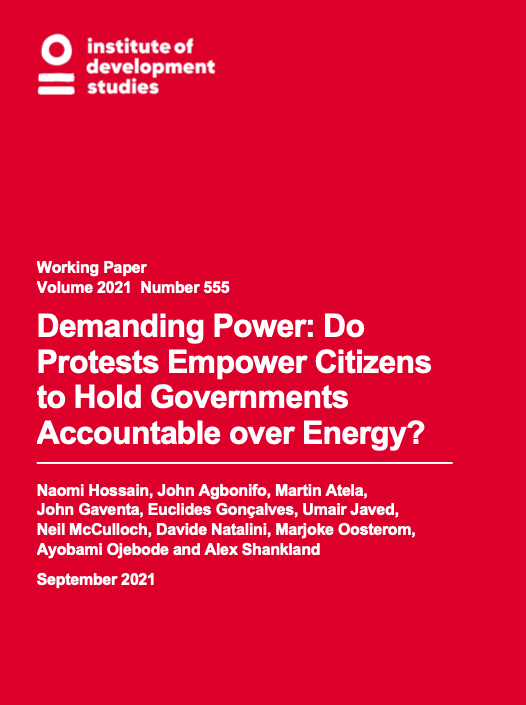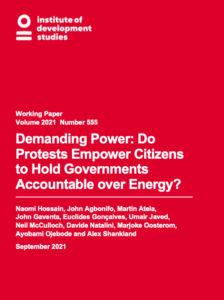John Agbonifo is a Reader and Acting Director of the Global Affairs and Sustainable Development Institute (GASDI), Osun State University. His research interests centre on conflicts attendant on environmental transformations mediated by multinational oil corporations. He explores the themes from a sub- Saharan African perspective, focusing on grassroots collective action, transparency, and accountability in the extractive industry in the Niger Delta. He has also worked on non-state armed actors and the use of UN and regional sanctions to promote international security. His publications include Environment and Conflict: The Place and Logic of Collective Action in the Niger Delta (2019, Routledge).
Martin Atela PhD is a research scientist with interests in accountability and governance, health systems, primary care, mixed-methods approaches to complex research and evidence-informed policymaking research. Martin heads the Research and Policy programme at the Partnership for African Social and Governance Research (PASGR – Kenya). He co-convened the A4EA Demanding Power research workstream. He earned his PhD from the University of Cambridge, UK and is a Gates Cambridge Alumnus.
John Gaventa is a political sociologist, educator, and civil society practitioner with over 30 years of experience in research, teaching and facilitation, and organisational leadership in North and South. He has written and worked extensively on issues of citizenship and citizen engagement, power and participation, governance and accountability, and leadership for social change in a number of countries around the world. He is the Director of the Action for Empowerment and Accountability research programme, and previously directed the ten-year Development Research Centre on Citizenship, Participation and Accountability.
Euclides Gonçalves is a Researcher and Director at Kaleidoscopio – Research in Public Policy and Culture. He has published on topics such as governance, bureaucratic processes, and political rituals in scholarly journals.
Umair Javed is Assistant Professor of Politics and Sociology, at the Lahore University of Management Sciences (LUMS), and a Visiting Research Fellow at the Institute of Development and Economic Alternatives (IDEAS).
Neil McCulloch is a Director of The Policy Practice. His main area of focus is on the political economy of reform in the energy sector. This has included work on corruption in the electricity sector in Lebanon; power sector reform in Kyrgyzstan, Pakistan, and Nigeria; energy access in India; aid to power sector reform in Africa; and fuel subsidy reform in Indonesia and Nigeria. Previously, Dr McCulloch was the Director of the Economic Policy Program at Oxford Policy Management and, before that, the Lead Economist of the Australian Aid program in Indonesia.
Davide Natalini is a Senior Research Fellow at the Global Sustainability Institute based at Anglia Ruskin University. Davide is an interdisciplinary environmental social scientist. He studies complex social-ecological systems, systemic risk, and sustainable development, with specific focus on environmental security and conflict. His latest research focuses in particular on investigating the drivers of food and fuel riots in countries. Marjoke Oosterom is a Research Fellow at the Institute of Development Studies (IDS). With a background in comparative politics and international development studies, her research concentrates on the effects of political violence, repression, and armed conflict on forms of agency, citizenship, and identity, in Sub Saharan Africa. Her expertise is in youth politics; and she is the principal investigator on an ESRC-funded project on youth and political socialisation in the informal economy in Zimbabwe, and a British Academy-funded project on workplace sexual violence in Uganda and Bangladesh. Ayobami Ojebode (PhD) is Professor of Applied Communication, Department of Communication & Language Arts, University of Ibadan, Nigeria. His research interests are community communication, community governance, new media, and political communication. He was the Nigeria country lead for the first phase of the A4EA work which focused on the Bring Back Our Girls movement, and the Principal Investigator [Nigeria] for the UK Department for International Development (DFID)-funded Evidence and Lessons from Latin America (Phase II) study which focused on community-based crime prevention in Africa and Latin America. He is skilled in policy-engaged research, multidisciplinary and mixed- method research, and research skills training and development. Alex Shankland co-convenes the IDS Power and Popular Politics research cluster. He has worked for over two decades on civil society, accountability, and citizen-state engagement in Mozambique and Brazil, focusing particularly on social movements and unruly politics in relation to closing civic space. Alex has worked as an advisor to bilateral and multilateral donors on social accountability and democratic governance initiatives as well as leading several research projects in Mozambique.


